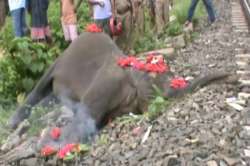Baby elephant dies, hit by speeding train in Assam
Guwahati, Aug 3 : A five-year-old baby elephant was hit by a speeding express train near Jagi road on the outskirts of Guwahati on Thursday. The animal died on the spot. The tragic incident took place

Guwahati, Aug 3 : A five-year-old baby elephant was hit by a speeding express train near Jagi road on the outskirts of Guwahati on Thursday.
The animal died on the spot. The tragic incident took place at around midnight on the rail tracks that pass near Amchung wildlife sanctuary on the outskirts of the city.
A local villager said, killing of elephants by speeding trains have become common in recent months. "We want some forest guards to be deployed here to avert such tragic accidents."
Railway tracks pass through five major elephant reserves in Assam, often cutting through natural elephant corridors.
A study conducted by the Wildlife Trust of India has revealed that as many as 187 elephants have been killed by trains in the country between 1987 and 2011, of which Assam accounts for 37 per cent or 69 cases.
A report in August 2010 by the Elephant Task Force said that 150 elephants were killed in train collisions since 1987.
Assam tops the list with 36 per cent of the total jumbo casualties followed by West Bengal with 26 per cent and Uttarakhand with 14 per cent.
Most of these hits occurred during a 12-hour span between 6pm and 6am.
Banarhat area of West Bengal's Jalpaiguri district earned the dubious distinction of killing the most elephants - seven - in a single hit (2010).
Five elephants died in the following year.
IIT-Delhi has developed a wireless sensor device called ‘The Wild Animal Protection System', which will not only help detect the presence of elephants on the track but also activate a signal system to the nearest station to warn trains to slow down or stop.
The animal died on the spot. The tragic incident took place at around midnight on the rail tracks that pass near Amchung wildlife sanctuary on the outskirts of the city.
A local villager said, killing of elephants by speeding trains have become common in recent months. "We want some forest guards to be deployed here to avert such tragic accidents."
Railway tracks pass through five major elephant reserves in Assam, often cutting through natural elephant corridors.
A study conducted by the Wildlife Trust of India has revealed that as many as 187 elephants have been killed by trains in the country between 1987 and 2011, of which Assam accounts for 37 per cent or 69 cases.
A report in August 2010 by the Elephant Task Force said that 150 elephants were killed in train collisions since 1987.
Assam tops the list with 36 per cent of the total jumbo casualties followed by West Bengal with 26 per cent and Uttarakhand with 14 per cent.
Most of these hits occurred during a 12-hour span between 6pm and 6am.
Banarhat area of West Bengal's Jalpaiguri district earned the dubious distinction of killing the most elephants - seven - in a single hit (2010).
Five elephants died in the following year.
IIT-Delhi has developed a wireless sensor device called ‘The Wild Animal Protection System', which will not only help detect the presence of elephants on the track but also activate a signal system to the nearest station to warn trains to slow down or stop.